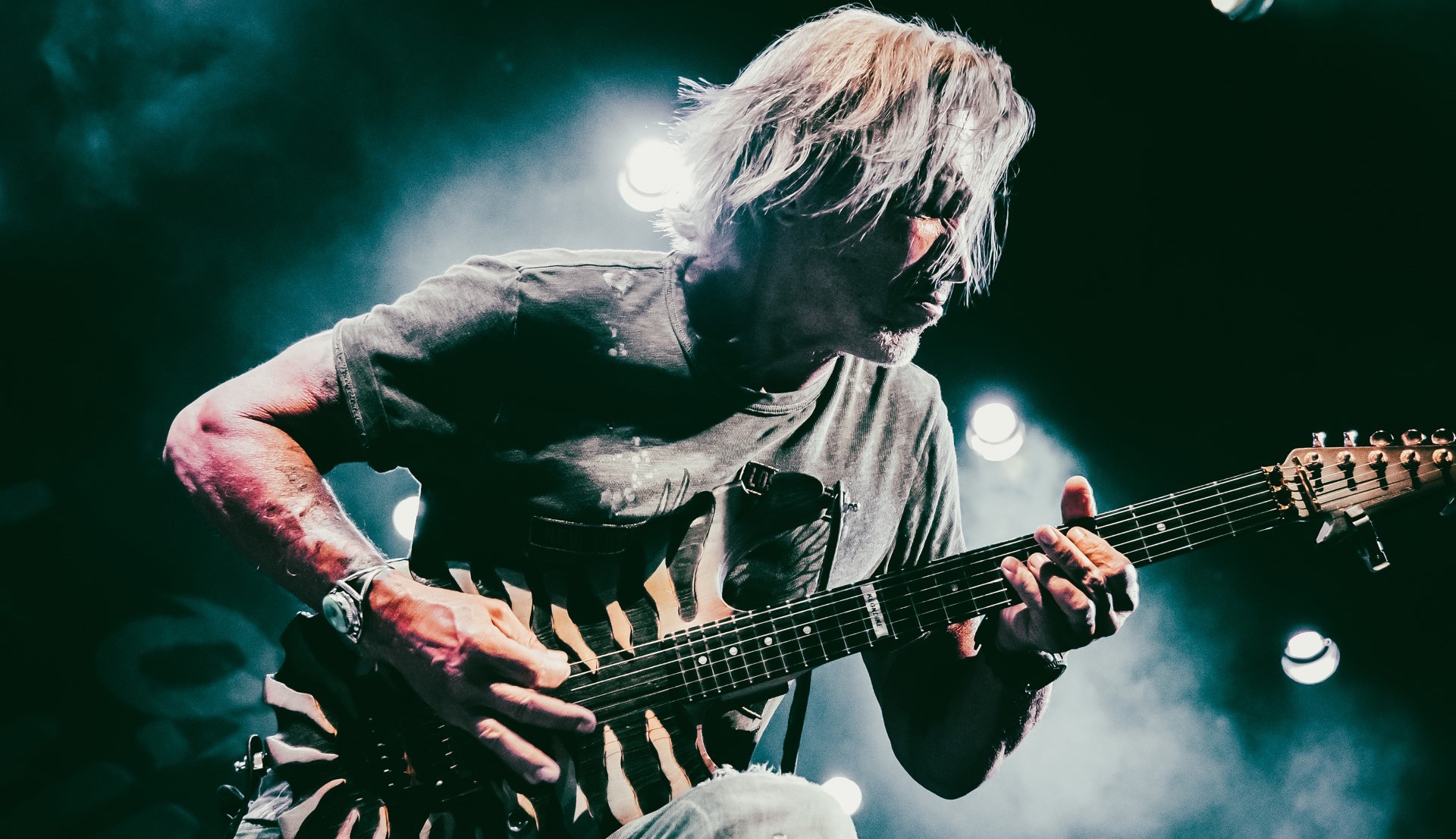“We want to give fans one last chance to see a really kickass show before we wind it up”: George Lynch on why he's retiring his long-running band, his unlikely Gibson studio favorite, and that Peavey business...
The veteran shredder reveals why he has to “relearn and re-familiarize myself with the guitar constantly”, and what prompted him to revert his band's name back to Lynch Mob, after changing it briefly to Electric Freedom

Aside from Lynch Mob's latest album, Babylon, the most recent news surrounding George Lynch is the reemerging of allegations the veteran guitarist made in 2018 against Peavey while guesting on Island Music Co's Determination & Overdrive podcast.
Of course, we're talking about something Lynch said five years ago, and indeed, he assumed the allegations were dead and buried. But then again, that something is pretty big.
As Lynch reflected on his time as a Peavey artist, he discussed the not-so-sunny atmosphere he found when visiting the brand's Meridian, Mississippi base in the mid-2000s: “I don't think having slaves do your work, for for-profit corporations, is right thing to do,” Lynch said in 2018, “But the thing is, they'll get away with it, which they were.”
Lynch's words on the brand’s reported use of prison labor might have stayed buried if not for YouTuber KDH, who unearthed them while opining that Lynch left Peavey's stable after refusing to sign a nondisclosure agreement and also rejecting the idea of “promising never to reveal the fact that [Peavey] uses prison labor to build its amps.”
Public statements have since been issued by Peavey asking Lynch to retract his comments, which, to date, he has not. To that end, while in conversation with Guitar World in support of Lynch Mob's latest, Babylon, the former icon of all-things '80s shred had the following to say: “Hypocrisy is the problem.”
He continues, “The thing that the incident reveals to me, as it should for everybody else, is a much larger political and economic problem. It's the idea that profits are more important than people. We need to mature as a society and align our priorities with what is inherently and morally the right way to exist and be truly good to each other.”
Lynch declined to discuss the matter further, and conversation instead focuses on his new album Babylon, his namesake band's eighth and final long-player.
Get The Pick Newsletter
All the latest guitar news, interviews, lessons, reviews, deals and more, direct to your inbox!
Indeed, the band's retirement seems to have been on the cards for some time, as Lynch found himself in his own state of murky morality in recent years, struggling with internal pressure to change the name of his band from Lynch Mob to… something else. And for a moment there, that something manifested as George Lynch and the Electric Freedom, which didn't last long.
Within a year or so of the Electric Freedom moniker being installed, it was cast aside, and Lynch Mob returned, as has new music in the form of Babylon. When asked what led him back to the epithet that made him famous outside of Dokken, he says, “The truth is Electric Freedom just didn't work, but I tried.”
“That said, I've really never gotten much flak for the Lynch Mob, which surprises me. The real issue is that I was never comfortable with it and became increasingly uncomfortable with it in recent years, but I just learned to accept the reality of what it is and roll with it.”
Have Lynch Mob's consistent lineup changes affected your songwriting process?
“[Our] Longtime drummer Jimmy D'Anda, bass player extraordinaire Jaron Gulino, and Gabriel Colon on vocals make up Lynch Mob today. We have a different sound with this lineup.
“Once we were finished with the record, I wasn't sure what we had, and after listening to it, I thought it sounded more like Guns N' Roses than Lynch Mob in some cases, which I didn't think was bad. I guess once we stopped chasing the Wicked Sensation version of Lynch Mob and just decided to be ourselves, we put ourselves in a good position to see what comes of it.”

What made Wicked Sensation so special that you felt you needed to chase it for so long?
“Wicked Sensation came together under a unique set of circumstances when there was a paradigm shift in the musical landscape. I know many people loved that record – it did well – but I learned over time that chasing that record would be an exercise in futility. That record was about timing, money and the fact that I felt I had something to prove, which I think I did.”
How did the sessions for Babylon kick off? Are these new tracks or ones you've had in the vaults?
“We started with a clean slate. I just wrote the music, like I do [for] all my records, by working in my studio with an engineer and some synthetic drum tracks, and then I started piecing the songs together.
“I always carry hundreds of ideas around as a reference on my phone. And even if there's not an idea in there that I'll use, it'll sometimes spark another idea, so it is a handy tool. I'm always very paranoid that I'm gonna lose the notes on my iPhone, so I have them backed up in a million places.”
If you listen to some of my records that I've done in recent years, I'm recycling some ideas, and I think I do that subconsciously, but that's never stopped AC/DC from doing it, right?
And how do you keep from muddying the waters between your many projects?
“I run my ideas by everybody and get a consensus on whether it's working. The thing with regurgitating and reusing ideas I've used in the past is that I never play anything the same way twice. And when you have a different band, especially a different singer, even if I played the same thing twice with two different singers, it's gonna sound completely different.
“If you listen to some of my records that I've done in recent years, I'm recycling some ideas, and I think I do that subconsciously, but that's never stopped AC/DC from doing it, right?”
What gear played the most significant role while recording Babylon?
“My main go-to amp has been my 1968 Marshall Plexi 50-watt. It's just so natural-sounding and wonderful, so I tour with it as well. As for guitars, I'm all over the map, but on most of my records, my core sound is a couple of ESPs, like the Tiger Stripe, and my Kamikaze. But I also throw other things in the mix, like my 1960 Les Paul and even my old Melody Maker with a P-90 in it.
“I use the latter frequently during my recordings, and I'll throw my Linhof Tele on top of a rhythm track to give it a little more spank. And if I need a little more boost for the solos, I'll use my Malaysian chip [Ibanez] Tube Screamer, my Klon, or my Dallas Arbiter [Fuzz Face].”
I like guitar-building, because I know what most players who look to me to build them a guitar want in a guitar, which is for it to be inspiring aesthetically and tactilely
Is making music still your greatest passion, or do you get more satisfaction out of building guitars?
“I love doing all things music-related. Even the business, the marketing, the promotion, the contracts, and believe it or not, designing the merchandise. And I still love touring, recording, and, yes, the outside projects, like building guitars in my shop.
“I like guitar-building, because I know what most players who look to me to build them a guitar want in a guitar, which is for it to be inspiring aesthetically and tactilely. That aside, I do love the process of running the businesses and interacting with my band, who are my friends and family, and the fans, too. All of it is very rewarding, but I also have many other interests outside of music, which have to do with nature.”
Do you think you'll ever stop making music?
“No, it's an organic impulse, so I can't see denying that. Every decision I make and action I take has a potential butterfly effect that won't ever stop.
“It would be unnatural and probably unhealthy, but I also have other creative outlets. But making music is different now – in the early days of Lynch Mob, we had much bigger budgets, which affected the process. And because I'm a relatively unschooled musician, I will always have to relearn and re-familiarize myself with the guitar constantly. So, I don't think I'll ever stop because the impulse within me will always be there.”
Your recent posts suggest Lynch Mob are coming to an end. What brought that on?
“We’ve decided as a band that we want to end our over 39-year run on a high and positive note. This is a great version of the band, with its own sound, while still retaining elements of the trademark Lynch Mob style.”
So, what’s the plan, then?
“We plan to hit 2024 hard by touring the U.S. heavily, and then a few key dates in beginning of ’25, making sure we get to every nook and cranny in the country. We want to give fans one last chance to see a really kickass Lynch Mob show before we wind it up.”
- Babylon is out now.
Andrew Daly is an iced-coffee-addicted, oddball Telecaster-playing, alfredo pasta-loving journalist from Long Island, NY, who, in addition to being a contributing writer for Guitar World, scribes for Bass Player, Guitar Player, Guitarist, and MusicRadar. Andrew has interviewed favorites like Ace Frehley, Johnny Marr, Vito Bratta, Bruce Kulick, Joe Perry, Brad Whitford, Tom Morello, Rich Robinson, and Paul Stanley, while his all-time favorite (rhythm player), Keith Richards, continues to elude him.
“The main acoustic is a $100 Fender – the strings were super-old and dusty. We hate new strings!” Meet Great Grandpa, the unpredictable indie rockers making epic anthems with cheap acoustics – and recording guitars like a Queens of the Stone Age drummer
“You can almost hear the music in your head when looking at these photos”: How legendary photographer Jim Marshall captured the essence of the Grateful Dead and documented the rise of the ultimate jam band








![John Mayer and Bob Weir [left] of Dead & Company photographed against a grey background. Mayer wears a blue overshirt and has his signature Silver Sky on his shoulder. Weir wears grey and a bolo tie.](https://cdn.mos.cms.futurecdn.net/C6niSAybzVCHoYcpJ8ZZgE.jpg)

![A black-and-white action shot of Sergeant Thunderhoof perform live: [from left] Mark Sayer, Dan Flitcroft, Jim Camp and Josh Gallop](https://cdn.mos.cms.futurecdn.net/am3UhJbsxAE239XRRZ8zC8.jpg)